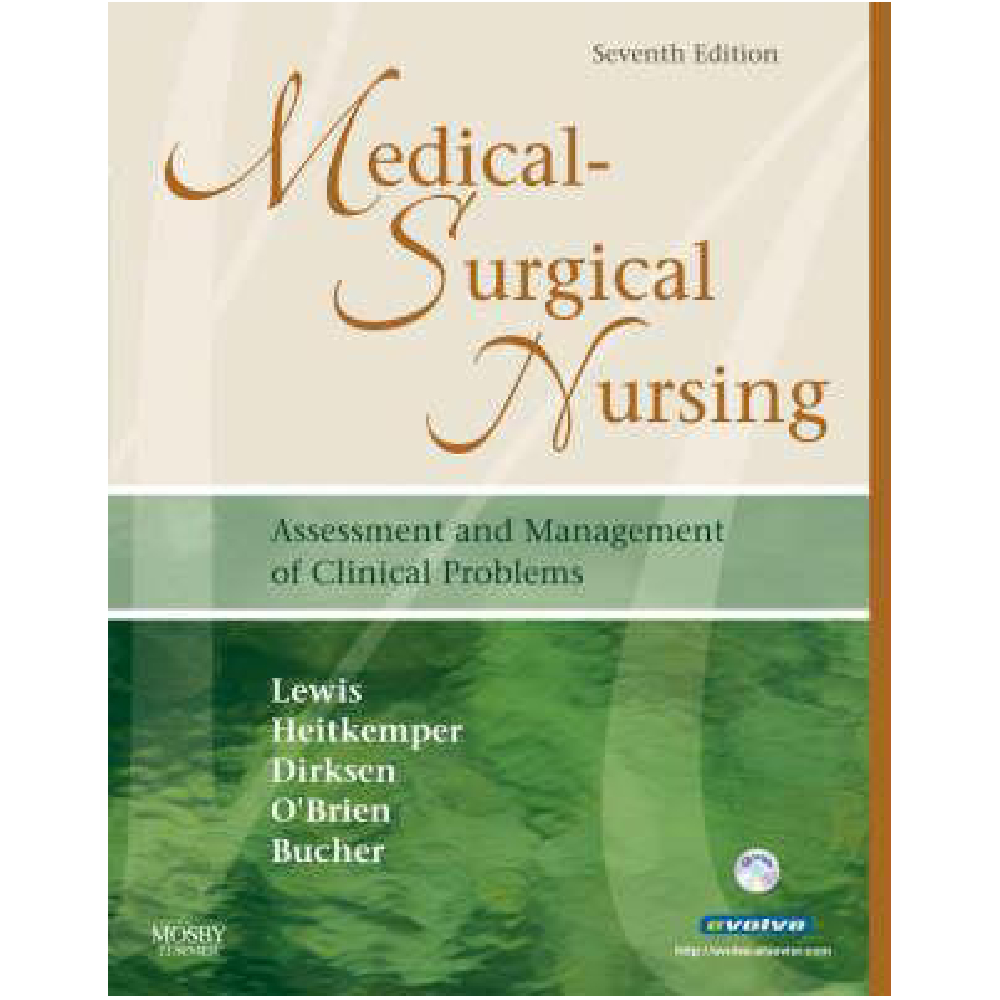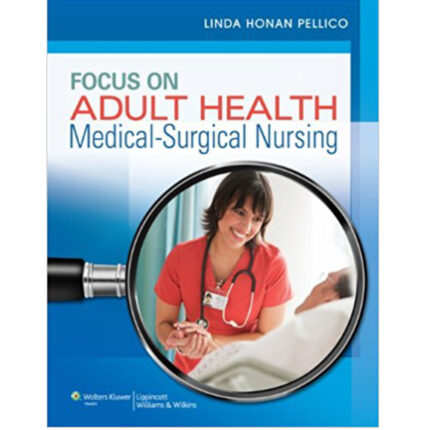Medical Surgical Nursing Single Volume Assessment and Management of Clinical Problems 7th Edition by Sharon L. Lewis -Test Bank
Chapter 11: End-of-Life and Palliative Care
MULTIPLE CHOICE
1. The nurse is caring for a patient who has 20-second periods of apnea followed by periods of deep and rapid breathing. The nurse documents this finding as
a. death-rattle respirations.
b. agonal breathing.
c. apneustic breathing.
d. Cheyne-Stokes respiration.
Correct Answer: D
Rationale: Cheyne-Stokes respirations are characterized by periods of apnea alternating with deep and rapid breaths. The death rattle is caused by accumulation of mucus in the airways, causing wet-sounding respirations. Agonal breathing has a very slow and irregular rate and rhythm. Apneustic respirations are irregular and gasping.
Cognitive Level: Application Text Reference: p. 152
Nursing Process: Assessment NCLEX: Physiological Integrity
2. A nursing student who is caring for a dying patient asks the nurse, “How will we know when the patient has died?” The nurse explains that the patient will be considered legally dead when
a. the patient is flaccid and unresponsive.
b. respiratory efforts cease and no apical pulse is audible.
c. the patient is comatose, apneic, and without brainstem reflexes.
d. CPR is ineffective in restoring heartbeat.
Correct Answer: C
Rationale: The diagnosis of death is based on brain death; therefore, death has occurred when the patient has irreversible loss of all brain functions, including brainstem functions that control respirations and brainstem reflexes. The other descriptions describe other clinical manifestations associated with death but are insufficient to declare a patient legally dead.
Cognitive Level: Comprehension Text Reference: p. 153
Nursing Process: Assessment NCLEX: Physiological Integrity
3. A patient near death is manifesting a decrease in all body system functions except for a heart rate of 124 and a respiratory rate of 28. The nurse explains to the family that these symptoms
a. will continue to increase until death finally occurs.
b. are a normal response before these functions decrease.
c. may be associated with an improvement in the patient’s condition.
d. indicate a reflex response to the slowing of other body systems.
Correct Answer: B
Rationale: An increase in heart and respiratory rate may occur prior to the slowing of these functions in the dying patient. Heart and respiratory rate typically slow as the patient progresses further toward death. In a dying patient, high respiratory and pulse rates do not indicate improvement and it would be inappropriate for the nurse to indicate this to the family. The changes in pulse and respirations are not reflex responses.
Cognitive Level: Comprehension Text Reference: p. 152
Nursing Process: Implementation NCLEX: Physiological Integrity
4. A patient who has been diagnosed with metastatic malignant melanoma and has a poor prognosis plans an extensive trip around the country “to finally see some of the places I’ve always wanted to visit and to see some family I haven’t seen in years.” The nurse recognizes that the patient is manifesting the psychosocial response of
a. restlessness.
b. saying goodbye.
c. unfinished business.
d. altered decision making.
Correct Answer: C
Rationale: The patient’s statement indicates that there are some things that he or she would like to accomplish before dying. Restlessness is frequently a behavior associated with the patient’s inability to express needs, but this patient seems very clear in communicating needs. There is no clear indication that the patient is planning to saying good-bye to these relatives. The patient’s decision making is appropriate.
Cognitive Level: Application Text Reference: p. 153
Nursing Process: Assessment NCLEX: Psychosocial Integrity
5. A family member of a patient who is being admitted with nausea tells the nurse that the patient was diagnosed 2 months ago with pancreatic cancer but has not kept appointments with the doctor and has continued daily activities unchanged from before the diagnosis. When assessing the patient, the nurse will expect that the patient
a. will be very angry about the cancer diagnosis.
b. will not mention anything about pancreatic cancer.
c. may express despair about the cancer diagnosis.
d. may ask about options for treatment of the cancer.
Correct Answer: B
Rationale: The patient’s behaviors have been consistent with the denial, shock and disbelief, and avoidance stages described by various authors, and not mentioning cancer is consistent with this stage of grief. Anger, despair, and asking about treatment options are more consistent with other stages of grief such as anger, depression, and acceptance.
Cognitive Level: Application Text Reference: p. 153
Nursing Process: Assessment NCLEX: Psychosocial Integrity
6. The wife of a patient with terminal lung cancer visits daily and cheerfully talks with the patient about vacation plans for the next year. When asked by the nurse how she is feeling, she says, “I’m busy at work, but otherwise things are fine.” An appropriate nursing diagnosis for the wife is
a. caregiver role strain related to feeling overwhelmed.
b. disabled family coping related to lack of grieving.
c. anxiety related to complicated grieving process.
d. hopelessness related to knowledge deficit about cancer.
Correct Answer: B
Rationale: The wife’s behavior and statements indicate the presence of absent grief, which may lead to impaired adjustment as the patient progresses toward death. The wife does not appear to feel overwhelmed or anxious. The evidence does not support hopelessness as a problem for the patient’s wife.
Cognitive Level: Application Text Reference: p. 154
Nursing Process: Diagnosis NCLEX: Psychosocial Integrity
7. As the nurse admits a patient with AIDS who has cryptococcal meningitis, the patient tells the nurse, “If my heart or breathing stop, I do not want to be resuscitated.” The nurse should
a. document the request in the patient’s record and place a DNR notation in the care plan.
b. ask the patient if these wishes have been discussed with the admitting health care provider.
c. inform the patient that a notarized advance directive must be included in the record or resuscitation must be performed.
d. advise the patient to designate a person to make health care decisions when the patient is not able to make them independently.
Correct Answer: B
Rationale: A health care provider’s order should be written describing which actions nurses should take if the patient requires CPR, but the primary right to decide belongs to the patient or family. The nurse should document the patient’s request but does not have the authority to place the DNR order in the care plan. A notarized advance directive is not needed to establish the patient’s wishes. The patient may need a durable power of attorney for health care (or the equivalent), but this does not address the patient’s current concern with possible resuscitation.
Cognitive Level: Application Text Reference: pp. 155-156
Nursing Process: Implementation
NCLEX: Safe and Effective Care Environment
8. A patient who is very close to death is very restless and repeats, “I am not ready to die.” The most appropriate intervention by the nurse is to
a. call the hospital chaplain to come and visit or pray with the patient.
b. sit at the bedside and ask if there is anything the patient needs.
c. inform the patient that everything possible is being done to delay death.
d. ask the patient what can be done to assist with the acceptance of death.
Correct Answer: B
Rationale: Staying at the bedside and listening allows the patient to discuss any unresolved issues that might be concerning him or her. Asking the patient’s own spiritual advisor to visit is appropriate, but the hospital chaplain might not be appropriate to meet the patient’s needs. Telling the patient that everything is being done or asking the patient how the nurse can help with the acceptance of death may not address the patient’s needs for psychosocial support.
Cognitive Level: Application Text Reference: pp. 159-160
Nursing Process: Implementation NCLEX: Psychosocial Integrity
9. Which of these patients is most appropriate for the nurse to refer to hospice care?
a. A 28-year-old with AIDS-related dementia who needs palliative care and pain management
b. A 56-year-old with advanced liver failure whose family members can no longer care for him or her at home
c. 60-year-old with lymphoma whose children are unable to discuss issues related to dying
d. A 72-year-old with chronic severe pain as a result of spinal arthritis and vertebral collapse
Correct Answer: A
Rationale: Hospice is designed to provide palliative care such as symptom management and pain control for patients at the end of life. Patients who require more care than the family can provide, whose families are unable to discuss important issues related to dying, or who have severe pain are candidates for other nursing services but are not appropriate hospice patients.
Cognitive Level: Application Text Reference: pp. 156-157
Nursing Process: Planning
NCLEX: Safe and Effective Care Environment
10. A patient in a hospice program is experiencing continuous, increasing amounts of pain. The nurse caring for the patient plans the scheduling of opioid pain medications to provide
a. prn doses of medication whenever the patient requests.
b. around-the-clock routine administration of analgesics.
c. enough pain medication to keep the patient sedated and unaware of stimuli.
d. analgesic doses that provide pain control without decreasing respiratory rate.
Correct Answer: B
Rationale: The principles of beneficence and nonmaleficence indicate that the goal of pain management in a terminally ill patient is adequate pain relief even if the effect of pain medications could hasten death. Administration of analgesics on a prn basis will not provide the consistent level of analgesia the patient needs. Patients usually do not require so much pain medication that they are oversedated and unaware of stimuli. Adequate pain relief may require a dosage that will result in a decrease in respiratory rate.
Cognitive Level: Application Text Reference: p. 161
Nursing Process: Planning
NCLEX: Safe and Effective Care Environment













Reviews
There are no reviews yet.